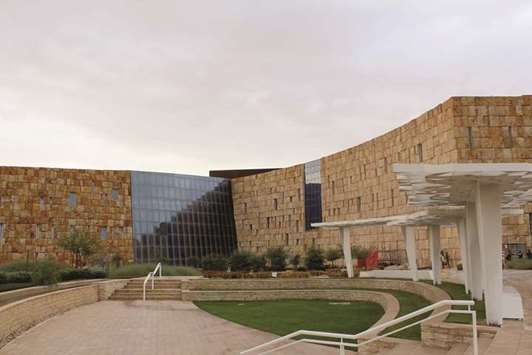Nicholas Negroponte is the founder and chairman emeritus of MIT’s (Massachusetts Institute of Technology) Media Lab. He is an inventor, thinker, and angel investor. He has pushed the boundaries of connectivity and communication. He recently shared his thoughts on the evolving world of digital information with the students, faculty, and staff at Northwestern University in Qatar (NU-Q).
“Professor Negroponte is a pioneer in the world of inter-activity and multi-media, and he has been a driving force behind much of the innovation and developments that have shaped our world today,” said Everette E Dennis, Dean and CEO. “For many years he has led and supported an enormous array of projects that brought new discoveries to the digital world.”
The Media Lab, which helped drive the multi-media revolution, was established in 1984 by Negroponte as a centre for research and innovation, and the intersection of art, science, and technology. Since then, the lab has developed hundreds of original ideas and produced research on new technology including touch-screen sensitivity and flat panels long before they were introduced to the market.
“The thing I am most proud of is not the hundreds of projects that we create every year, but merely the existence of the Media Lab, which continues to serve as a hub for innovation and creativity,” said Negroponte.
Negroponte, known for his philanthropic work, founded the One Laptop Per Child organisation, which designs, develops, and distributes low-cost laptops for children around the world with a mission to empower them through education. “The one thing I realised throughout the years is that the telecommunications industry does not work in the interest of people,” said Negroponte, “yet, we are reaching a time when I believe connectivity should be a human right.”
A combination of serendipity and years of hard work gave Negroponte a chance to pitch the concept to the pope, who became an avid supporter and partner. With the pope’s support, the United Nations Security Council may be voting to change the international rights regarding access to Internet connectivity in the coming year. “My hope, and this is truly a hope, is that there is a 50 percent chance the UN might declare connectivity as a human right in a resolution, which will be interesting because human rights are free and all you have to do to qualify is be human, and that really does change the landscape,” said Negroponte.
Throughout the conversation, which was moderated by Dennis, Negroponte discussed his hits and misses on predictions he made about the world of technology.
“I made many predictions throughout my life, some of which materialised and others that simply didn’t,” said Negroponte. “Some examples of those that did are touch innovation, which many people opposed and thought would be inconvenient, as well as flat panels; however, I also spoke passionately about working models of 3D holography, which did not materialise.”
Negroponte explained that the point of making predictions is not always to be accurate, but to put ideas into the minds of people who could make these thoughts and aspirations a reality and to start a conversation about it.
Negroponte was in Qatar to deliver the keynote address for Qatar National Library’s official opening.
NU-Q draws from its parent organisation, Northwestern University (Evanston, Illinois), a distinguished history, famous programmes and an exceptional faculty. Founded in partnership with Qatar Foundation, NU-Q provides a framework through which the students explore the world and, ultimately, shape its future through its distinguished schools of communication, journalism and strategic communication, and liberal arts.
CAMPUS: Northwestern University in Qatar. File Photo

CAMPUS: Northwestern University in Qatar. File Photo
